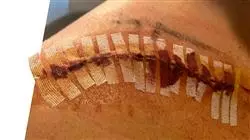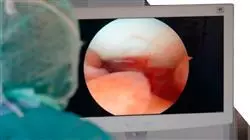University certificate
The world's largest faculty of medicine”
Introduction to the Program
Update your knowledge in Rotator Cuff Surgery and Glenohumeral Joint Instability with this Postgraduate diploma that you will only find at TECH"

In Rotator Cuff Surgery and Glenohumeral Joint Instability Surgery the possibility of injury recurrence is a major concern. Although surgical procedures are designed to repair and stabilize the shoulder joint, several factors can contribute to re-injury. Therefore, it is essential for physicians to keep up to date with the latest surgical advances and techniques, suture materials, rehabilitation protocols and understanding of risk factors to significantly improve the outcomes of these procedures.
In this sense, TECH has developed this program that will allow the specialist to enjoy an excellent update on Rotator Cuff Surgery and Instability of the Glenohumeral Joint. During 6 months of intensive updating, you will learn in depth about rotator cuff diseases, anamnesis and clinical examination, maneuvers and diagnostic techniques and rehabilitation in cuff rupture. In addition, he will delve into anterior and posterior instability, as well as the complications and sequels of glenohumeral instability.
A Postgraduate diploma offered in a 100% online format, providing the professional with the necessary flexibility to reconcile their daily responsibilities with their updating process. In addition, the program integrates the Relearning method, which allows the physician to explore the fundamental aspects of the curriculum in depth, without investing long hours in memorization. All this from any device with internet connection and with the possibility of access from any time and place.
You will explore in detail the anatomical structure of the Rotator Cuff and Scapular Waist, and identify the appropriate surgical techniques to address them"
This Postgraduate diploma in Rotator Cuff Surgery and Glenohumeral Joint Instability contains the most complete and up-to-date scientific program on the market. The most important features include:
- The development of case studies presented by expert orthopedic surgeons
- The graphic, schematic, and practical contents with which they are created, provide scientific and practical information on the disciplines that are essential for professional practice
- Practical exercises where self-assessment can be used to improve learning
- Its special emphasis on innovative methodologies
- Theoretical lessons, questions to the expert, debate forums on controversial topics, and individual reflection assignments
- Content that is accessible from any fixed or portable device with an Internet connection
Implement in your clinical practice the most effective diagnostic and exploration techniques for rotator cuff pathologies"
The program includes in its teaching staff professionals from the sector who bring to this program the experience of their work, as well as recognized specialists from leading societies and prestigious universities.
Its multimedia content, developed with the latest educational technology, will provide the professional with situated and contextual learning, i.e., a simulated environment that will provide an immersive education programmed to learn in real situations.
The design of this program focuses on Problem-Based Learning, by means of which the professional must try to solve the different professional practice situations that are presented throughout the academic course. For this purpose, the student will be assisted by an innovative interactive video system created by renowned experts.
In just 6 months you will identify the most effective treatment for Rotator Cuff Disease, as well as its progression in the rehabilitation process"

You will delve into the therapeutic options for Subacromial Syndrome without Rotator Cuff injuries"
Why study at TECH?
TECH is the world’s largest online university. With an impressive catalog of more than 14,000 university programs available in 11 languages, it is positioned as a leader in employability, with a 99% job placement rate. In addition, it relies on an enormous faculty of more than 6,000 professors of the highest international renown.

Study at the world's largest online university and guarantee your professional success. The future starts at TECH”
The world’s best online university according to FORBES
The prestigious Forbes magazine, specialized in business and finance, has highlighted TECH as “the world's best online university” This is what they have recently stated in an article in their digital edition in which they echo the success story of this institution, “thanks to the academic offer it provides, the selection of its teaching staff, and an innovative learning method aimed at educating the professionals of the future”
A revolutionary study method, a cutting-edge faculty and a practical focus: the key to TECH's success.
The most complete study plans on the university scene
TECH offers the most complete study plans on the university scene, with syllabuses that cover fundamental concepts and, at the same time, the main scientific advances in their specific scientific areas. In addition, these programs are continuously being updated to guarantee students the academic vanguard and the most in-demand professional skills. In this way, the university's qualifications provide its graduates with a significant advantage to propel their careers to success.
TECH offers the most comprehensive and intensive study plans on the current university scene.
A world-class teaching staff
TECH's teaching staff is made up of more than 6,000 professors with the highest international recognition. Professors, researchers and top executives of multinational companies, including Isaiah Covington, performance coach of the Boston Celtics; Magda Romanska, principal investigator at Harvard MetaLAB; Ignacio Wistumba, chairman of the department of translational molecular pathology at MD Anderson Cancer Center; and D.W. Pine, creative director of TIME magazine, among others.
Internationally renowned experts, specialized in different branches of Health, Technology, Communication and Business, form part of the TECH faculty.
A unique learning method
TECH is the first university to use Relearning in all its programs. It is the best online learning methodology, accredited with international teaching quality certifications, provided by prestigious educational agencies. In addition, this disruptive educational model is complemented with the “Case Method”, thereby setting up a unique online teaching strategy. Innovative teaching resources are also implemented, including detailed videos, infographics and interactive summaries.
TECH combines Relearning and the Case Method in all its university programs to guarantee excellent theoretical and practical learning, studying whenever and wherever you want.
The world's largest online university
TECH is the world’s largest online university. We are the largest educational institution, with the best and widest online educational catalog, one hundred percent online and covering the vast majority of areas of knowledge. We offer a large selection of our own degrees and accredited online undergraduate and postgraduate degrees. In total, more than 14,000 university degrees, in eleven different languages, make us the largest educational largest in the world.
TECH has the world's most extensive catalog of academic and official programs, available in more than 11 languages.
Google Premier Partner
The American technology giant has awarded TECH the Google Google Premier Partner badge. This award, which is only available to 3% of the world's companies, highlights the efficient, flexible and tailored experience that this university provides to students. The recognition as a Google Premier Partner not only accredits the maximum rigor, performance and investment in TECH's digital infrastructures, but also places this university as one of the world's leading technology companies.
Google has positioned TECH in the top 3% of the world's most important technology companies by awarding it its Google Premier Partner badge.
The official online university of the NBA
TECH is the official online university of the NBA. Thanks to our agreement with the biggest league in basketball, we offer our students exclusive university programs, as well as a wide variety of educational resources focused on the business of the league and other areas of the sports industry. Each program is made up of a uniquely designed syllabus and features exceptional guest hosts: professionals with a distinguished sports background who will offer their expertise on the most relevant topics.
TECH has been selected by the NBA, the world's top basketball league, as its official online university.
The top-rated university by its students
Students have positioned TECH as the world's top-rated university on the main review websites, with a highest rating of 4.9 out of 5, obtained from more than 1,000 reviews. These results consolidate TECH as the benchmark university institution at an international level, reflecting the excellence and positive impact of its educational model.” reflecting the excellence and positive impact of its educational model.”
TECH is the world’s top-rated university by its students.
Leaders in employability
TECH has managed to become the leading university in employability. 99% of its students obtain jobs in the academic field they have studied, within one year of completing any of the university's programs. A similar number achieve immediate career enhancement. All this thanks to a study methodology that bases its effectiveness on the acquisition of practical skills, which are absolutely necessary for professional development.
99% of TECH graduates find a job within a year of completing their studies.
Postgraduate Diploma in Rotator Cuff Surgery and Glenohumeral Joint Instability
The rotator cuff is a set of four muscles and tendons that surround the shoulder joint, providing stability and mobility. Rotator cuff injuries are common and can cause pain, weakness and limitation of motion in the shoulder. On the other hand, glenohumeral joint instability is characterized by a lack of stability and can be caused by traumatic or congenital injuries. The TECH Postgraduate Diploma is a highly relevant specialized academic program in the field of orthopaedic medicine. This degree offers healthcare professionals the opportunity to acquire advanced knowledge and specialized skills in the diagnosis and treatment of shoulder injuries. The Postgraduate Diploma in Rotator Cuff Surgery and Glenohumeral Joint Instability program provides participants with comprehensive training in the evaluation and management of these injuries. Students will learn about the most up-to-date surgical techniques, including arthroscopic cuff repair and glenohumeral joint reconstruction.
Study 100% online
This Postgraduate Diploma in Rotator Cuff Surgery and Glenohumeral Joint Instability features the online mode of study, allowing students to manage their daily life time at convenience. TECH has the best teaching staff specialized in the subject, and the best technological tools such as multimedia content, virtual library and specialized scientific readings to be consulted on the academic platform. The importance of this program lies in the need for trained professionals who can provide specialized and quality care to patients with shoulder injuries. The knowledge acquired in this Postgraduate Certificate will allow participants to be referents in the field of rotator cuff surgery and instability of the glenohumeral joint, thus improving the health and quality of life of patients, in addition to having the best job opportunities in the market.







